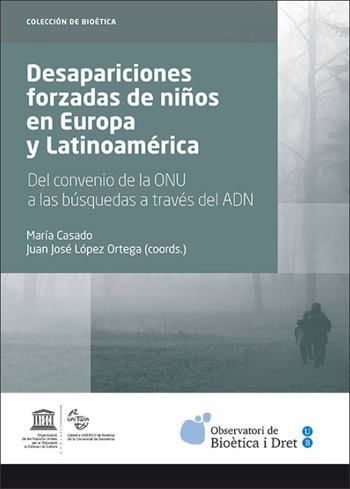The Bioethics and Law Obs.
Master in Bioethics and Law
Master in Food Ethics and Law
UNESCO Chair in Bioethics
Contact
- Bioethics and Law Observatory
- UNESCO Chair in Bioethics
- University of Barcelona
- Faculty of Law
- Ave. Diagonal, 684
- 08034 Barcelona
- (+34) 93 403 45 46
- obd.ub@ub.edu
- Master in Bioethics and Law
- (+34) 93 403 45 46
- master.bd@ub.edu
Stolen babies, disappeared people and international law on the seminar “ADN i desaparicions forçoses”
 Forensic genetics, bioethics and human rights, stolen babies and the use of DNA to find disappeared people are some of the contents included on the programme of the seminar "ADN i desaparicions forçoses", organised by the Bioethics and Law Observatory (OBD) and the Unesco Chair in Bioethics of the University of Barcelona (UB). The seminar takes place next Monday, 16 February, in the Aula Magna of the Faculty of Law of the UB, within the 9th International Seminar on the Universal Declaration on Bioethics and Human Rights of the Unesco.
Forensic genetics, bioethics and human rights, stolen babies and the use of DNA to find disappeared people are some of the contents included on the programme of the seminar "ADN i desaparicions forçoses", organised by the Bioethics and Law Observatory (OBD) and the Unesco Chair in Bioethics of the University of Barcelona (UB). The seminar takes place next Monday, 16 February, in the Aula Magna of the Faculty of Law of the UB, within the 9th International Seminar on the Universal Declaration on Bioethics and Human Rights of the Unesco.
Enforced disappearances: society’s reaction
Genetic studies and the UN International Convention for the Protection of All Persons from Enforced Disappearance are two powerful tools to elucidate biological origin and fight against baby theft and enforced disappearances. These severe crimes must be examined from different perspectives: legal, philosophical, political and bioethical. In face of such a complex situation affecting people, a responsible society must take some measures.
The international seminar is opened at 9.30 a.m. by the Rector Dídac Ramírez; the dean of the Faculty of Law, Dr Enoch Albertí, and the director of the OBD, Dr Maria Casado. At 10.30 a.m., the round table talk "ADN i dret en la lluita contra les desaparicions forçoses" (DNA and law in the fight against enforced disappearances) takes place. Gemma Marfany, lecturer in the Department of Genetics, and Jaume Saura, lecturer in the Department of International Law and Economics, participate in the debate, moderated by Maria Casado.
Stolen babies in Spain
At 12.30 p.m., the session "Les desaparicions forçoses a Amèrica i Europa" (Enforced disappearances in America and Europe) gathers Gabriella Citrone, senior legal advisor of Track Impunity Always (TRIAL) and lecturer at the University of Milano–Bicocca, and Rainer Huhle, member of the Committee on Enforced Disappearances of the United Nations, on a round table talk moderated by Juan José López Ortega, judge of the Provincial Court of Madrid and member of the former committee.
At 4 p.m., child disappearance and baby theft in Spain are discussed. Speakers are Antonio Alonso, secretary of the Spanish Commission for the Forensic Use of DNA; Carlos Fernàndez-Liesa, expert from the University Carlos III, and Lorena Àlvarez, prosecutor in Madrid. Discussion is moderated by Professor Anna Badia, director of the Master of International Studies of the UB.
Presentation of the book dealing with child dissapearance in Europe and Latin America
The book Desapariciones forzadas de niños en Europa y Latinoamérica. Del convenio de la ONU a las búsquedas a través del ADN, coordinated by Maria Casado and Juan José Ortega, is presented at 6.30 p.m. by Ana Sánchez Urritia, member of the Observatory. The volume, which is part of the Col·lecció de Bioètica edited by Publicacions i Edicions UB and the Unesco Chair in Bioethics of the UB, analyses delicate incidents of child disappearance occurred in Europe and Latin America.
The work is divided into four main parts. The first one, "El ADN como instrumento de búsquedas familiares", describes the scientific basis of DNA use and analysis as a tool to look for disappeared people. The second, "La protección contra la desaparición forzada en el marco de la ONU", analyses protection against enforced disappearances provided by the Convention for the Protection of All Persons from Enforced Disappearance and the Working Group on Enforced Disappearances of the United Nations. The third part analyses the situation in South and Central America. Finally, the fourth section is focused on child enforced disappearances in Europe, particularly in Spain.
The Col·lecció de Bioètica of the OBD promotes a flexible, multidisciplinary and secular notion of bioethics, within a framework of respect for recognised human rights. The aim is to provide reliable information and arguments to encourage social debate and independent decision-making, thus contributing towards a more transparent and democratic society.
Further information:
- Seminar on Bioethics and Law
- Review of the book Desapariciones forzadas de niños en Europa y Latinoamérica
Source: www.ub.edu/web/ub/en/menu_eines/noticies/2015/02/022.html




